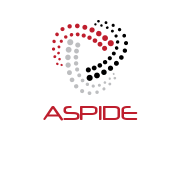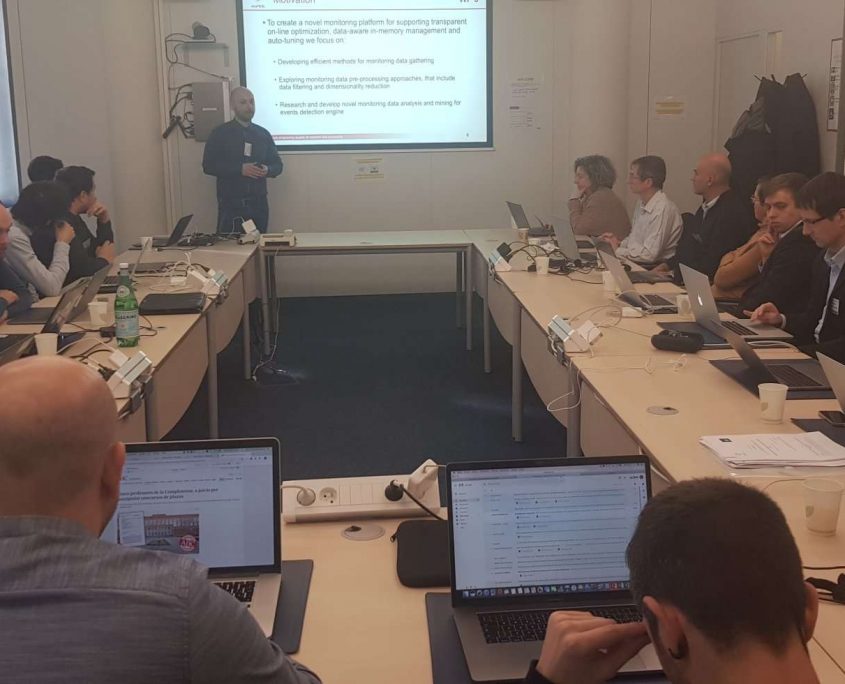The newspaper “Kronen Zeitung” published the article “IM KAMPF GEGEN CORONA: Universität Klagenfurt forscht mit den Chinesen” with Prof. Radu Prodan.
The newspaper “Kleine Zeitung” published the article “Medizinische Schutzausrüstung: Neue IT-Lösung soll Menschenleben retten” with Prof. Radu Prodan.
Authors: Dragi Kimovski, Dijana C. Bogatinoska, Narges Mehran, Aleksandar Karadimce, Natasha Paunkoska, Radu Prodan, Ninoslav Marina
Abstract: The proliferation of smart sensing and computing devices, capable of collecting a vast amount of data, has made the gathering of the necessary vehicular traffic data relatively easy. However, the analysis of these big data sets requires computational resources, which are currently provided by the Cloud Data Centers. Nevertheless, the Cloud Data Centers can have unacceptably high latency for vehicular analysis applications with strict time requirements. The recent introduction of the Edge computing paradigm, as an extension of the Cloud services, has partially moved the processing of big data closer to the data sources, thus addressing this issue. Unfortunately, this unlocked multiple challenges related to resources management. Therefore, we present a model for scheduling of vehicular traffic analysis applications with partial task offloading across the Cloud — Edge continuum. The approach represents the traffic applications as a set of interconnected tasks composed into a workflow that can be partially offloaded to the Edge. We evaluated the approach through a simulated Cloud — Edge environment that considers two representative vehicular traffic applications with a focus on video stream analysis. Our results show that the presented approach reduces the application response time up to eight times while improving energy efficiency by a factor of four.
This project started during the most critical phase of the COVID-19 outbreak in Europe where the demand for Personal Protective Equipment (PPE) from each country’s health care system has
surpassed national stock amounts by far. Therefore, the ADAPT consortia agreed to bundle its joint resources to develop and adaptive and autonomous decision-making network to support the involved stakeholders along the PPE Supply Chain in their endeavour to save and protect human lives as quickly as possible.
The partners will do that by providing a Blockchain solution capable of optimizing supply, demand and transport capacities between them, elaborating a technical solution for transparent and realtime certification checks on equipment and production documentation as well as distributed and parallel decision-making capabilities on all levels of this multi-dimensional research problem.
In total, the world community will spent more than € 49,6 billion on PPE medical equipment in 2020, € 7,7 billion thereof could be saved with the transport optimization of ADAPT and additional € 5,18 billion could be freed up in the financing and banking sector which could be reinvested immediately into the expansion of the world’s national health care systems.
ADAPT is a 36-month duration project submitted to 6th Call for Austrian-Chinese Coop. RTD Projects FFG & CAS.
Partners:
- Alpen-Adria Universität Klagenfurt, Institute of Information Technology (UNI-KLU)
- Johannes-Kepler-Universität Linz, Intelligent Transport Systems-Sustainable Transport Logistics 4.0. (JKU)
- Logoplan – Logistik, Verkehrs und Umweltschutz Consulting GmbH (LP)
- Intact GmbH (INTACT)
- Chinese Academy of Sciences, Institute of Computing Technology (ICTCAS)
Faculty of Technical Sciences, University of Klagenfurt nominated Alexander Lercher from ITEC (Radu Prodan‘s group) for Best Performer Award owing to his outstanding performance in studies. He will be conferred with this honor at a public presentation in lecture hall -3 of the University of Klagenfurt on September 16, 2020. In the course of research carried out by the Studies and Examination Department, Alexander was identified as the most successful student in this field of study.
Elsevier’s Journal of Information and Software Technology (INSOF) accepted the manuscript ”A Dynamic Evolutionary Multi-Objective Virtual Machine Placement Heuristic for Cloud Infrastructures”.
Authors: Ennio Torre, Juan J. Durillo (Leibniz Supercomputing Center), Vincenzo de Maio (Vienna University of Technology), Prateek Agrawal (University of Klagenfurt), Shajulin Benedict (Indian Institute of Information Technology), Nishant Saurabh (University of Klagenfurt), Radu Prodan (University of Klagenfurt).
Abstract: Minimizing the resource wastage reduces the energy cost of operating a data center, but may also lead to a considerably high resource over-commitment affecting the Quality of Service (QoS) of the running applications. The effective trade-off between resource wastage and over-commitment is a challenging task in virtualized Clouds and depends on the allocation of virtual machines (VMs) to physical resources. We propose in this paper a multi-objective method for dynamic VM placement, which exploits live migration mechanisms to simultaneously optimize the resource wastage, over-commitment ratio and migration energy. Our optimization algorithm uses a novel evolutionary meta-heuristic based on an island population model to approximate the Pareto optimal set of VM placements with good accuracy and diversity. Simulation results using traces collected from a real Google cluster demonstrate that our method outperforms related approaches by reducing the migration energy by up to 57 % with a QoS increase below 6 %.
Acknowledgements:
This work is supported by:
- European Union’s Horizon 2020 research and innovation programme, grant agreement 825134, “Smart Social Media Ecosytstem in a Blockchain Federated Environment (ARTICONF)”;
- Austrian Science Fund (FWF), grant agreement Y 904 START-Programm 2015, “Runtime Control in Multi Clouds (RUCON)“;
- Austrian Agency for International Cooperation in Education and Research (OeAD-GmbH) and Indian Department of Science and Technology (DST), project number, IN 20/2018, “Energy Aware Workflow Compiler for Future Heterogeneous Systems”.
The manuscript ”Expelliarmus: Semantic-Centric Virtual Machine Image Management in IaaS Clouds” is accepted for publication at the Journal of Parallel and Distributed Computing (JPDC) (https://www.journals.elsevier.com/journal-of-parallel-and-distributed-computing).
Authors: Nishant Saurabh (University of Klagenfurt), Shajulin Benedict (Indian Institute of Information Technology, Kottayam), Jorge G. Barbosa (LIACC, Faculdade de Engenharia da Universidade do Porto), Radu Prodan (University of Klagenfurt).
Abstract: Infrastructure-as-a-service (IaaS) Clouds concurrently accommodate diverse sets of user requests, requiring an efficient strategy for storing and retrieving virtual machine images (VMIs) at a large scale. The VMI storage management require dealing with multiple VMIs, typically in the magnitude of gigabytes, which entails VMI sprawl issues hindering the elastic resource management and provisioning. Nevertheless, existing techniques to facilitate VMI management overlook VMI semantics (i.e at the level of base image and software packages) with either restricted possibility to identify and extract reusable functionalities or with higher VMI publish and retrieval overheads. In this paper, we design, implement and evaluate Expelliarmus, a novel VMI management system that helps to minimize storage, publish and retrieval overheads. To achieve this goal, Expelliarmus incorporates three complementary features. First, it makes use of VMIs modelled as semantic graphs to expedite the similarity computation between multiple VMIs. Second, Expelliarmus provides a semantic aware VMI decomposition and base image selection to extract and store non-redundant base image and software packages. Third, Expelliarmus can also assemble VMIs based on the required software packages upon user request. We evaluate Expelliarmus through a representative set of synthetic Cloud VMIs on the real test-bed. Experimental results show that our semantic-centric approach is able to optimize repository size by 2.3-22 times compared to state-of-the-art systems (e.g. IBM’s Mirage and Hemera) with significant VMI publish and slight retrieval performance improvement.
Acknowledgements:
This work is supported by:
- European Union’s Horizon 2020 research and innovation programme, grant agreement 825134, “Smart Social Media Ecosytstem in a Blockchain Federated Environment (ARTICONF)”;
- Austrian Agency for International Cooperation in Education and Research (OeAD-GmbH) and Indian Department of Science and Technology (DST), project number, IN 20/2018, “Energy Aware Workflow Compiler for Future Heterogeneous Systems”
The manuscript “The Workflow Trace Archive: Open-Access Data from Public and Private Computing Infrastructures” has been accepted for publication in the A* ranked IEEE Transactions on Parallel and Distributed Systems (TPDS) journal.
Authors: Laurens Versluis, Roland Mathá, Sacheendra Talluri, Tim Hegeman, Radu Prodan, Ewa Deelman, and Alexandru Iosup
Abstract: Realistic, relevant, and reproducible experiments often need input traces collected from real-world environments. We focus in this work on traces of workflows—common in datacenters, clouds, and HPC infrastructures. We show that the state-of-the-art in using workflow-traces raises important issues: (1) the use of realistic traces is infrequent, and (2) the use of realistic, open-access traces even more so. Alleviating these issues, we introduce the Workflow Trace Archive (WTA), an open-access archive of workflow traces from diverse computing infrastructures and tooling to parse, validate, and analyze traces. The WTA includes >48 million workflows captured from >10 computing infrastructures, representing a broad diversity of trace domains and characteristics. To emphasize the importance of trace diversity, we characterize the WTA contents and analyze in simulation the impact of trace diversity on experiment results. Our results indicate significant differences in characteristics, properties, and workflow structures between workload sources, domains, and fields.
Acknowledgments: This work is supported by the projects Vidi MagnaData, Commit, the European Union’s Horizon 2020 Research and Innovation Programme, grant agreement number 801091 “ASPIDE”, and the National Science Foundation award number 1664162.
The first review of the ASPIDE project took place on 25.02.2020 in the premises of the European Commission in Luxemburg. During the project review, a live demo of the platform for supporting extreme scale applications was presented and future research and developing activities were discussed with the reviewers.






